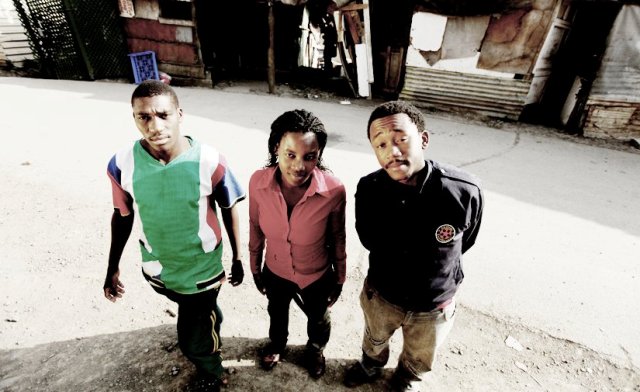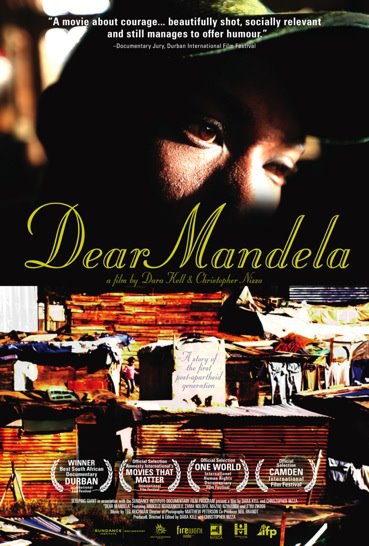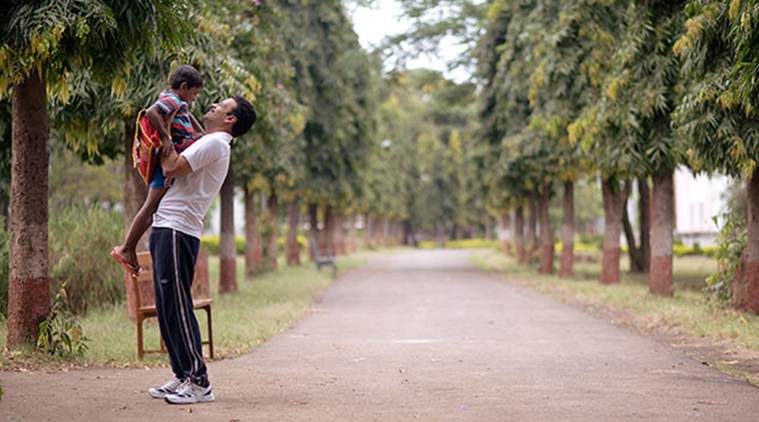Dear Mandela is a sensitive and nuanced portrayal of the struggles of the residents of informal settlements in contemporary South African cities, through the lives of three ordinary young shanty dwellers in Durban, who have been actively involved in the anti-eviction movement called Abahlali BaseMjondo that started in 2005.
The three protagonists of the film, all of whom are residents of informal settlements themselves, are Mnikelo, an activist and the elected spokesperson for the Abahlali movement, Zama, an aids orphan who worked in the community day care center for the children of shanty dwellers, and Mazwi, a school going boy who is the youngest to have a leadership position in the movement.
The film is appropriately titled as an invocation to Mandela because it captures the biggest irony faced by the poor in democratic post-apartheid South Africa. The shanty-dwellers who were the biggest supporters of Nelson Mandela and his party ANC in their struggle against apartheid were now opposing it for the unfair treatment meted out to them.
The contradiction that has thereby ensued in the lives of the poor forms the background of the narrative of the film. On the one hand, the poor feel a sense of loss and betrayal at the hands of the state that is not fulfilling its promise of providing them housing, keeping them in a permanent limbo by shifting them into transit camps, enacting legislation like Slum Act that give explicit powers of demolition to the state in contravention of their rights to housing in the constitution and unleashing its violence in order to quell their protests.
On the other hand, they also have an immense faith in what Mandela stood for: equality, democracy in which the poor have an equal voice in determining how they shall be governed and a life of dignity for all.
Almost with an ethnographer’s acumen the directors have attempted to show the poor and their habitations as they are. They have neither romanticized their poverty nor reduced them and their lives to mere abjectness. Thus we get a glimpse of their everyday lives and the challenges faced by them such as absence of basic facilities such as water (there is only one tap for 7000 people), electricity (there is a fire in a settlement in the absence of electricity connections because of which they are forced to use candles), health facilities and bad roads (a number of sick die due to their inability to reach hospitals as the ambulances find it hard to make their way into the settlements). The exigencies of their life demand extraordinary efforts from them.
Zama has to be a student, a mother and a worker, Mazwi has to perform in school and be a leader. He could not afford to remain a boy but become a young man who had to take the responsibility of his family and community. Zikode, who is the president of the movement, had to endure vandalism of his house and live in hiding.
The difficult circumstances of their lives, however, do not take away their lust for life, to have dreams and aspirations like all human beings. Mazwi wants to study, to find work to support his family and have a good life. Mnikelo wants to work for his community, die with credibility as a special man and not just an ordinary man.
The most striking feature of the film is that the directors, Dara Kell and Christopher Nizza, have not tried to represent the poor by imposing their own rationality and have honestly brought out the voices of the shanty dwellers. The film has highlighted that it is the poor themselves who best understand the problems of their lives and are most equipped to talk about them.
Mazwi’s words beautifully capture this emotion, “Being poor in life doesn’t mean being poor in mind.” The story of the movement and their decision to challenge the slum act of 2008 in the constitutional court is a testimony to their quest for being recognized as autonomous, rational, individuals. Their political struggle is about securing an equal participation with the government in deciding the fates of their settlements.
The film essentially brings out the will of the poor to partake in the opportunities presented by urbanization and challenge the fragmented nature and inequality of contemporary cities.
A film like Dear Mandela is extremely relevant in the 21st century, also known as the urban millennium, with most of the world’s population living in cities. The question of the role of the poor, living in informal settlements, in urban governance has assumed global significance.
Therefore, the film despite being situated in the South African context raises concerns that would find broader resonance in other parts of the world especially in the countries of Asia, Africa and Latin America. It is highly recommended for students, teachers, activists, lawyers, Non-Governmental Organizations, and most importantly, the communities facing similar circumstances in the rest of the world.
Written By: Shruti Dubey
(The author is a PhD candidate from Jawaharlal Nehru University, Delhi working on politics of urban poverty and informal settlements in Delhi. Views presented here are personal.)





